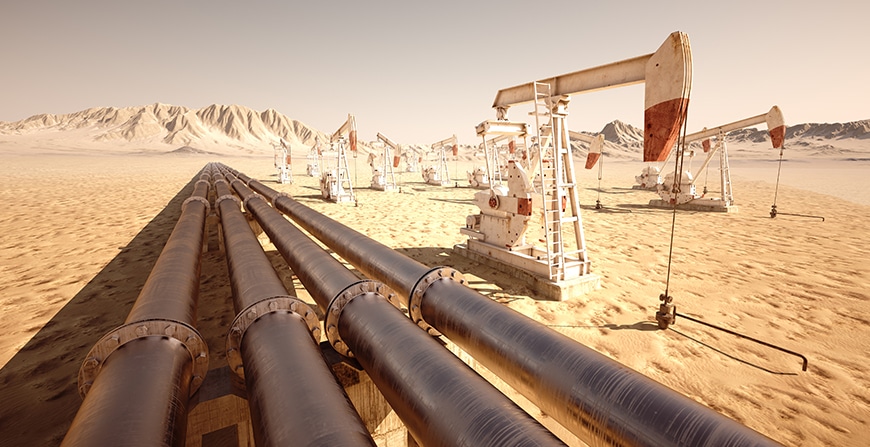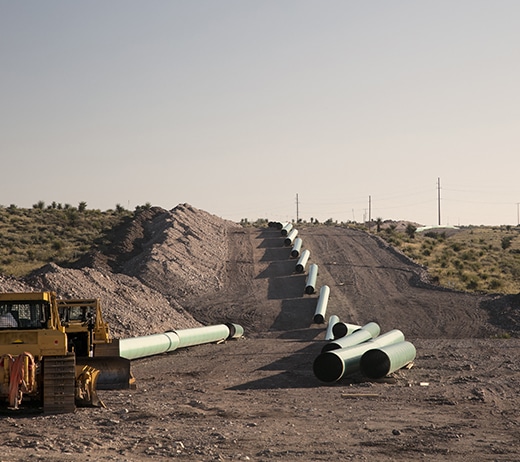
Reliable Texas Oil Pipeline Accident Attorneys
When you are injured in a gas or oil pipeline accident in Austin and Dallas
If you live in Texas, chances are you live near a pipeline. Our state is home to over 225,000 miles of pipelines of all different sizes, carrying gas and oil to residential and industrial locations all over the state. Because these lines are generally underground, we mostly pay them no mind – until an accident occurs. When an accident does happen, it can be catastrophic, both to pipeline workers and anyone in the immediate area.
Although pipelines are efficient and safe when operated and maintained properly, as they age, pipelines are subject to failure, leaks, and even explosions. Due to the massive cost of maintaining, repairing, and replacing pipelines, many companies are negligent in keeping up with these improvements, doing so at the extreme risk to workers and local residents. The Texas oil field accident attorneys at Slack Davis Sanger have decades of experience working with victims of pipeline ruptures, explosions, and spills. Talk to us today.
“Slack Davis Sanger handled our case with the utmost care, understanding, and professionalism. Above all, we felt like Mike Davis truly cared for our wellbeing and our future. We appreciate all they did for our family.” – Kyle Smith, Client
Involved in an Accident?
We're Ready to Help
What are oil and gas pipelines?
The United States employs over 2.5 million miles of pipeline to move hazardous liquid and gases, mostly underground. According to the Texas Pipeline Awareness Alliance, there are three types of pipelines: gathering, transmission, and distribution lines.
A gathering pipeline moves energy products from places like drilling sites over to processing plants and then to larger pipelines. Transmission pipelines move oil and gas from one part of the country to another – these are the main ways these forms of energy are transported back and forth across the nation. Distribution pipelines then connect oil and gas to places of business or residential homes.
Regardless of the size or length of a pipeline, the process of designing and constructing one must meet stringent safety regulations. Further, after a pipeline is constructed, it still holds a great level of risk. Construction workers, for example, must know exactly where pipelines are located before starting any digging or excavating. Failure to do so can result in a catastrophic accident or explosion.

What are the dangers of pipelines?
Baker Hughes reports that half of our nation’s pipelines are over 50 years old, and the majority of these existing pipelines are built from materials susceptible to corrosion. Since 2010, there have been 1,300 spills from U.S. pipelines, which translates to one spill every two days. Additionally, the U.S. Pipeline and Hazardous Materials Safety Administration (PHMSA) “Serious Incident 20 Year Trend” Report shows 695 incidents over the past 20 years. The PHMSA defines serious incidents as those that “ include a fatality or injury requiring in-patient hospitalization.” These 695 incidents caused 1,142 injuries and 256 fatalities. You can read other PHMSA incident reports here.
Pipeline incidents typically happen in one of two ways; they either leak or rupture. A leak is a slow release of oil or gas, while a rupture happens suddenly. These leaks and ruptures can occur for a wide variety of reasons, many of them preventable.
What are common causes of pipeline accidents?
The PHMSA collects and analyzes data around pipeline incidents, including causes of what they call “pipeline failures.” According to their investigations, pipeline accidents and explosions have six general causes.
Corrosion, a natural aging process where pipeline materials naturally deteriorate through rust and oxidation. This only becomes worse over time if not mitigated and repaired.
Excavation damage, which happens when a person or company inadvertently digs into a buried pipeline and damages it. This can occur during construction, road maintenance, cable installation, or utility work. Texas businesses and individuals are required by law to call 811 before any excavation work.
Natural force damage, as a result of naturally-occurring events like hurricanes, flooding, extreme temperatures, or earthquakes. The PHMSA notes that, even though weather force damage to pipelines is rare, when it does happen, it can be catastrophic.
Other outside force damage, which are forces other than excavation or weather. This can include things like vehicle crash damage to above-ground equipment, vandalism, terrorism or sabotage, or damage from accidents or fires from nearby businesses or homes.
Material/weld failure, a defect that occurs during the steel or pipe manufacturing process. Defects can also happen during the weld, when pipes and other components are joined together.
Equipment failure, which involves pumps, valves, tanks, compressors, and other components of the pipeline system. A failure of any of these can result in a leak or release of hazardous liquid or gas.
Incorrect operation, also known as human error. Operator error can include anything from opening the wrong valve, mismarking the location of a pipeline before excavation, failure to follow procedure, or failure to perform routine maintenance.
The attorneys at Slack Davis Sanger can launch an investigation to determine the cause of your accident and resulting injuries.
What types of injuries are caused by pipeline accidents?
Workers in the oil and pipeline industry are at risk for a number of injuries, and in the event of a serious accident, these injuries can be life-altering and disabling.
Back and neck injuries, including broken vertebrae and spinal cord injuries.
Broken bones, including shattered bones, compound fractures, and dislocated joints.
Burns, which can range from moderate to severe and life-threatening.
Injuries to the skin, which can include scarring, disfigurement, lacerations, and infection.
Loss of limb, either partial or full amputation, leading to damage in the hands, arms, legs, and feet.
Traumatic brain injuries, like concussions, skull fractures, and other open and closed injuries to the head.
Wrongful death, in the event your loved one loses their life from their injuries in a pipeline accident.
If you or a loved one sustained injury in a pipeline disaster, it’s crucial you seek experienced legal representation, as these types of cases are complex and can involve a variety of defendants.
What are the major pipeline companies in Texas?
Thousands of miles of pipelines crisscross the state, all under the ownership of different energy companies and manufacturers. In Texas, these companies include:
|
|
Do I need a Texas pipeline accident attorney for my case?
Although you legally don’t need an attorney for any case, it’s never advisable to go it alone after a serious or disabling injury. When the legal team at Slack Davis Sanger takes your case, you can take the time you need to recover from your injuries while we work to answer the important questions – Who owns the pipeline? Who is responsible for its maintenance? Was someone working on it or near it at the time of the accident? And finally, who is liable for your injuries?
Depending on the circumstances of your accident, liable parties could include your employer, the pipeline company, the pipeline manufacturer, a third-party contractor or worker, or a construction/utility company. Our attorneys will tap into our wide network of expert resources to determine who or what was responsible for your losses and damages, gather evidence supporting your case, and then seek compensation on your behalf.
You may be entitled to compensation for your current and future medical bills, property damage, loss of wages, and pain and suffering.
Oil and gas companies have some of the largest law firms in the country on their side. Ensure you have a strong and confident legal team on yours with Slack Davis Sanger.
Texas pipeline accident and injury lawyers with experience
The attorneys at Slack Davis Sanger aren’t afraid to take on oil and gas companies when their pipelines fail and cause injury to workers and residents. We fight for your right to compensation for your injuries and losses, advocating for you and your family. Contact us today to find out how we can help you. To schedule a free consultation at one of our offices in Austin, Dallas, or Fort Worth, please call 800-455-8686 or fill out our contact form.
